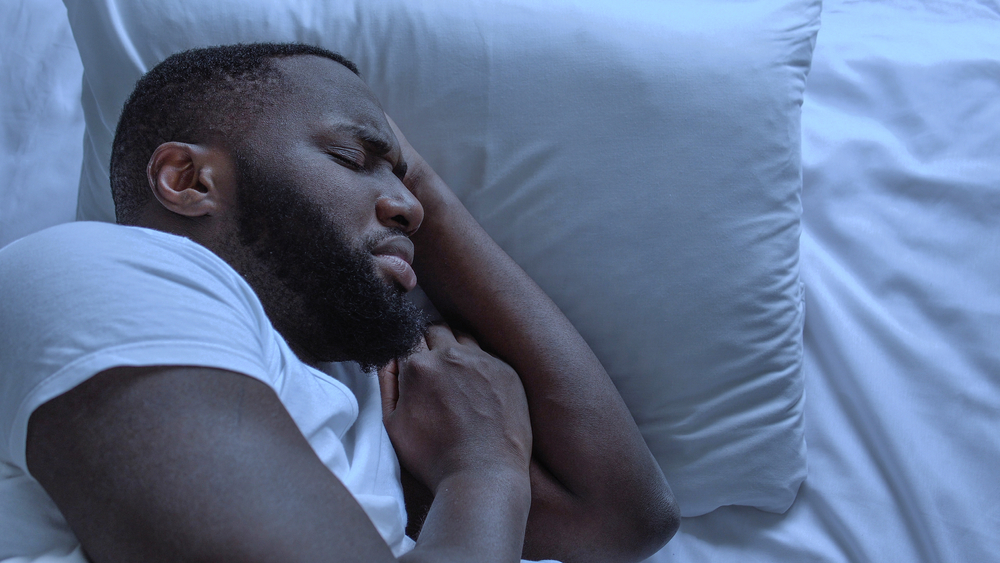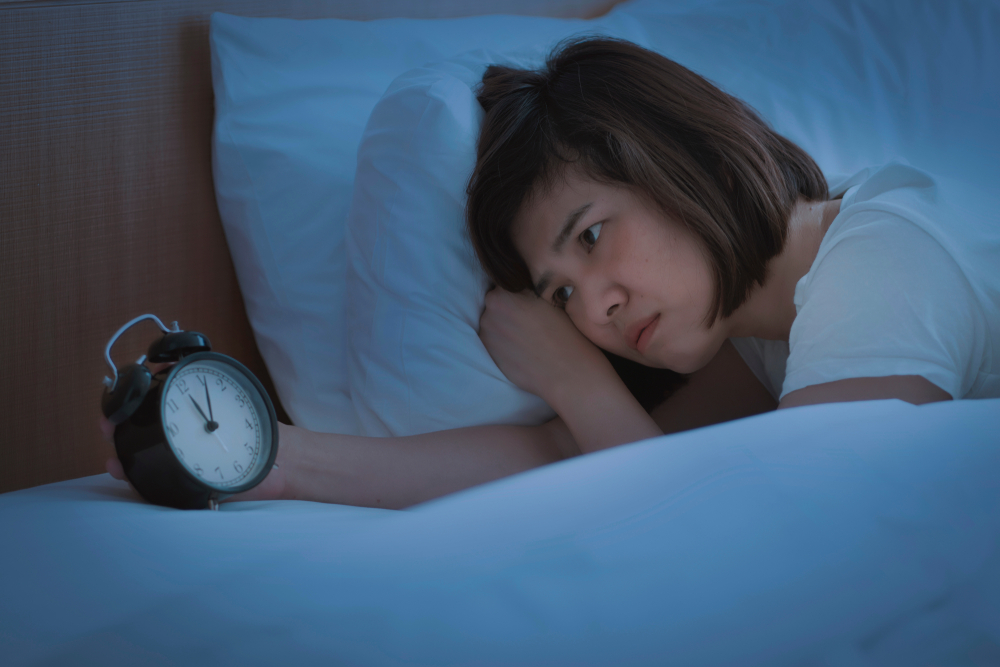NOT ALL INSOMNIA IS THE SAME
Why You Can’t Sleep & How To Fix Based On Eastern Medicine

Eastern medicine is all about balance. To stay healthy, you have to have a well-balanced flow of Qi throughout your mind and body. You can maintain this balance by eating well, staying active, and managing your emotional life.
Every now and then, some of your systems might become unbalanced, and that’s often when sickness or pain comes into the picture. Depending on where and what the imbalance is, these symptoms can range from sore muscles to insomnia.
Eastern medicine thinks about insomnia pretty differently than western medicine does. In the West, we lump everyone who can’t sleep together, calling them insomniacs. But in Eastern medicine, you’re categorized based off of what’s causing you to be unable to sleep. The two main groups are sleeplessness caused by too much of something (Qi, Heat, Phlegm, Yang, etc.) which may harass the Heart, and sleeplessness caused by too little of something.
Here, we break down a few of the different types of insomnia that TCM recognizes. We also list related symptoms to help you figure out what kind of problem you’re having, plus some ways to treat your sleep issues.
The Balance of Yin and Yang
Our Qi is made up of the opposite and complementary forces of yin and yang. The levels of yin and yang change throughout the day. During the day, the bright, hot power of yang takes over. At night, the cool and calm force of yin takes control.
Yin and yang affect our sleep. If you sleep too much, you probably have an overabundance of yin, while those who struggle to sleep enough likely contain too much yang.
Excess Patterns
Liver Fire
 If you’ve been experiencing a lot of strong emotions lately–especially anger–and you’re having trouble sleeping, the culprit might be liver fire. This type of sleeplessness is characterized by trouble falling asleep, and then dreaming all night long–so much so that you don’t feel rested when you wake up.
If you’ve been experiencing a lot of strong emotions lately–especially anger–and you’re having trouble sleeping, the culprit might be liver fire. This type of sleeplessness is characterized by trouble falling asleep, and then dreaming all night long–so much so that you don’t feel rested when you wake up.
Some other symptoms of excess liver fire are:
- Anger and irritability
- Constipation
- Chest tightness
- Headaches
- Dizziness
- Red tongue with yellow coating
Try to reduce liver fire by incorporating foods like seaweed, spinach, egg, and peppermint into your diet. You can use acupuncture to manage your liver fire levels, too.
Phlegm-Heat Disturbance
 If you’re the type of person who struggles to fall asleep and wakes up a lot throughout the night, your insomnia could be related to a disturbance in your phlegm heat. The phlegm is created by dampness in the stomach, which is usually caused by a subpar diet.
If you’re the type of person who struggles to fall asleep and wakes up a lot throughout the night, your insomnia could be related to a disturbance in your phlegm heat. The phlegm is created by dampness in the stomach, which is usually caused by a subpar diet.
If you have any of these symptoms alongside your sleeplessness, a phlegm-heat disturbance is probably the cause:
- Dizziness
- Irritability
- Chest tightness
- Fuzzy/heavy head
- Acid reflux
- Poor appetite
- Gas
- Nausea
- Red tongue with slimy yellow coating
To get rid of the phlegm and cool down the heat, talk to your TCM practitioner about Wen Dan Tang. It’s a popular phlegm remedy that has ingredients like bamboo shavings, dried tangerine peel, and licorice root in it. Wen dan tang is considered a cooling digestive remedy and is also given to prevent certain types of mental conditions, caused by Phlegm.
Deficiency Patterns
Heart and Spleen Deficiency
 If you’re a restless sleeper, your insomnia might be the fault of a deficiency with your Heart and Spleen. People with this kind of sleeplessness usually dream all night long, but wake up often and have difficulty falling back asleep. You might wake up at 4 or 5 in the morning and struggle to get back to bed, no matter how hard you try. This kind of insomnia also tends to show up more as we age.
If you’re a restless sleeper, your insomnia might be the fault of a deficiency with your Heart and Spleen. People with this kind of sleeplessness usually dream all night long, but wake up often and have difficulty falling back asleep. You might wake up at 4 or 5 in the morning and struggle to get back to bed, no matter how hard you try. This kind of insomnia also tends to show up more as we age.
Some other symptoms of Heart and Spleen deficiency besides trouble sleeping are:
- Pounding heart
- Dull skin
- Forgetfulness
- Dizziness
- Fatigue
- Poor appetite
- Pale tongue with thin white coating
Heart and spleen related insomnia is caused by a combo of poor circulation (which affects the heart) and low nutrient supply (which affects the spleen). To fix this, you want to encourage blood production and boost your Qi levels.
Yin Deficiency From Heart Fire
People with chronic illness and conditions are more likely to have insomnia due to low Yin levels. The kidney becomes too weak to regulate the Liver and Heart, which creates heat in these organs. You might feel uneasy and struggle to fall asleep–plus, you probably can’t sleep through the night.
Other symptoms include:
- Heart palpitations
- Anxiety or uneasiness
- Dizziness
- Ear ringing or tinnitus
- Poor memory
- Problems with sexual intimacy
- Dry mouth
- Red tongue
To ease this kind of insomnia, try to build up your yin levels by making time for self care, getting out into nature, and disconnecting from screens.
Qi Deficiency of Heart and Gallbladder
 If you’re known to wake up in the middle of the night from bad dreams or sleep terrors, you might be dealing with Qi deficiency. When our Qi levels get too low, our organs and blood don’t have enough energy to keep firing on all cylinders. This kind of insomnia also means you dream too much to get good quality sleep, and falling asleep is difficult–especially if you’re alone.
If you’re known to wake up in the middle of the night from bad dreams or sleep terrors, you might be dealing with Qi deficiency. When our Qi levels get too low, our organs and blood don’t have enough energy to keep firing on all cylinders. This kind of insomnia also means you dream too much to get good quality sleep, and falling asleep is difficult–especially if you’re alone.
Some other symptoms you might have include:
- Heart palpitations
- Anxiety/being easily startled
- Overthinking
- Pale tongue with a thin coating
- Trouble breathing deeply
- Low energy
- Sweating
To fix this issue, work on replenishing your Qi by working out and eating a seasonal, healthy diet. This will strengthen your body, mind, and Qi levels!
In TCM, insomnia isn’t one size fits all, so it’s important to figure out what kind of sleeplessness you’re experiencing. Since every system and organ in our bodies work in harmony, when one thing is out of whack, you might suffer in other places.
If you’re having trouble sleeping, have you noticed any of these other symptoms to help you identify the deeper root of your problems?
Comments (0)
Leave a reply
You must be logged in to post a comment.




